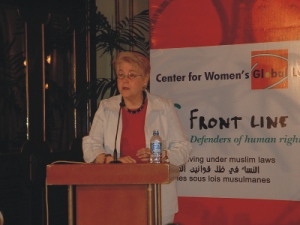Law Event
Global Consultation Meeting
To protect the women human rights defenders
29 November 2005 2 December 2005 Colombo, Sri Lanka
Nearly 200 women's rights and human rights activists from approximately 70 countries worldwide gathered in Colombo, Sri Lanka, to begin an historic global gathering on women human rights defenders which is first in its nature.
The aim of the international consultation was to bring attention to the need for special protection of WHRDs and other human rights activists defending the rights of women. Specifically, it will focus on articulating the concept, rights and entitlements of WHRDs; identifying the specific vulnerabilities, violations and abuses committed against WHRDs; and drafting recommendations and strategies to improve the protection for WHRDs. The initiative was aimed to present cases and develop analyses and recommendations for better protection of WHRDs to be submitted to Ms. Jilani for consideration. Ms. Jilani is expected to submit her reports to the UN Commission on Human Rights and the UN General Assembly in 2006.
The consultation was attended by the First Lady of Sri Lanka, Shiranthi Rajapakse, and opened with a welcome address by Nimalka Fernando, from the Women's Alliance for Peace and Democracy in Sri Lanka. The meeting highlights experiences of women who defend a range of human rights issues, as well as women and men around the globe who defend the human rights of women. The consultation is focusing on the challenges faced by women human rights defenders in their political organising challenges that are often targeted at and specific to women precisely because of their sex and gender. Abuses include violence, harassment, and intimidation, and can take the form of rape, forced psychiatric treatment and attacks designed to discredit defenders' reputations, among other violations. The gathering marks the first time women's rights and human rights groups have come together on a global level to address gender-specific concerns and experiences of women as human rights defenders.
Conference participants addressed specific risks and violations women around the world face in their work in defense of human rights, whether that work explicitly focuses on women's rights or not. Defenders face specific challenges as women addressing a global rise in
 |
| Charlotte Bunch, from the Center for Women's Global Leadership in the United States. Photo: Fire |
fundamentalisms and militarism and a climate increasingly hostile to the work of political activists in various social movements and regions. As women, they face some of the same abuses all defenders do, yet they are also exposed to or targeted for gender-based violence and gender-specific risks.
The gathering is linked to an international campaign launched in 2004 entitled “Defending Women Defending Rights: the International Campaign on Women Human Rights Defenders (ICWHRD). ICWHRD is an international initiative for the recognition and protection of women activists who advocate the realisation of human rights for all people. Formed as a coalition of women's rights and human rights organisations, the Campaign is rooted in overwhelming evidence that many women who are active in different aspects of human rights work routinely face harassment, abuse, violence, discrimination and marginalisation because of their gender, sexual identity and their advocacy.
In a keynote speech, Hina Jilani, the UN Special Representative to the Secretary General on Human Rights Defenders, spoke of an urgent need to identify and consider the special issues faced by women working in the human rights field in order to ensure that their important part in the struggle for universal human rights is fully recognized and valued. She noted that women human rights defenders are particularly vulnerable to attack because they often defy cultural norms of gender, heterosexuality and femininity in their identities and in the course of their advocacy. She pointed out that in addition to formal state structures, groups including religious movements, local communities and families are often responsible for these violations, and that it is vital for human rights strategies to take these actors into account.
Speaking on behalf of the International Coordinating Committee for the consultation, Charlotte Bunch, from the Center for Women's Global Leadership in the United States, outlined the primary themes of the consultation: abuses by the state, persecution perpetrated by fundamentalist groups, sexuality-based attacks, and the significant role of family and community members in creation of widespread marginalisation of and discrimination and violence toward defenders. She noted that, “Promoting rights related to the family and sexuality is often seen to threaten patriarchal institutions and that can bring about heightened hostility toward those defenders. The attacks can be deeply personal, and the efforts to silence us can be experienced in emotional ways.”
The consultation was ended with a set of recommendations including to observe 29, November every year as an International Day for women human rights defenders.
Source: Women Human Rights Defenders (WHRDs).